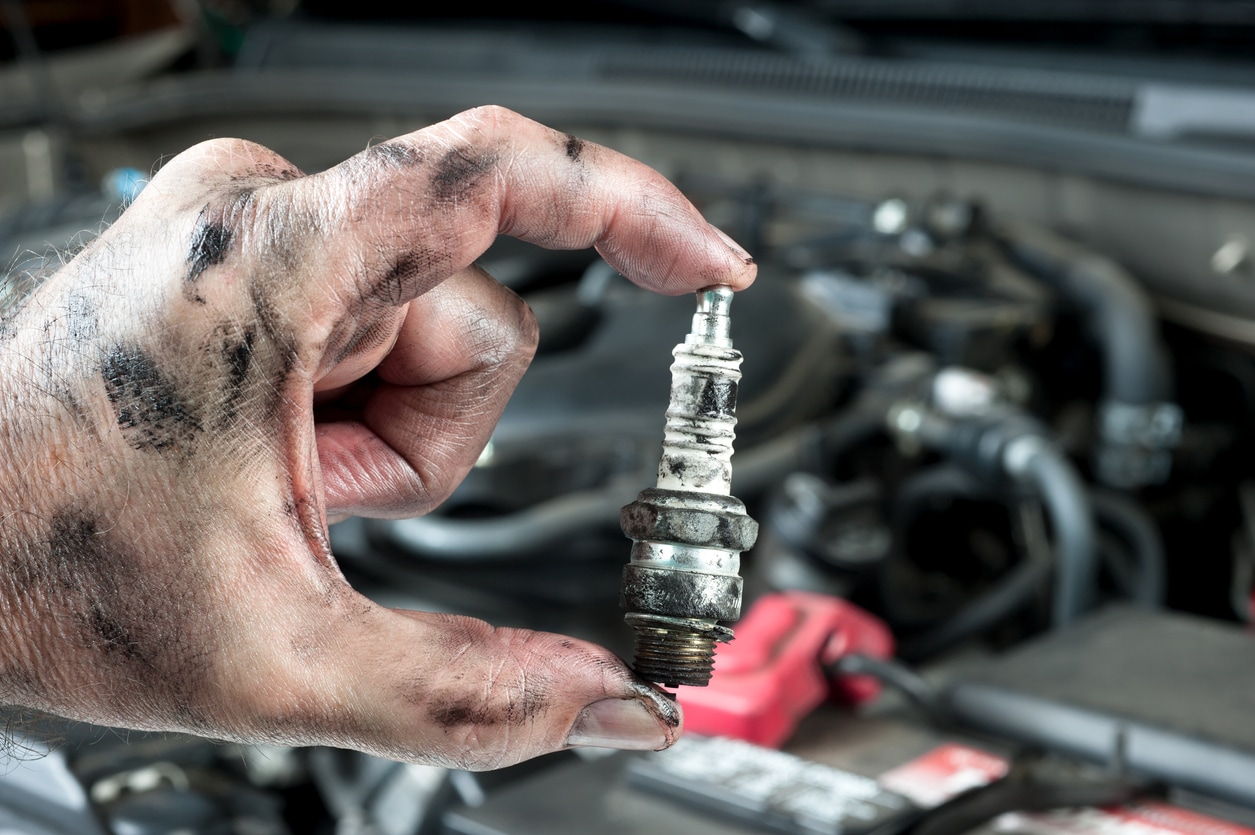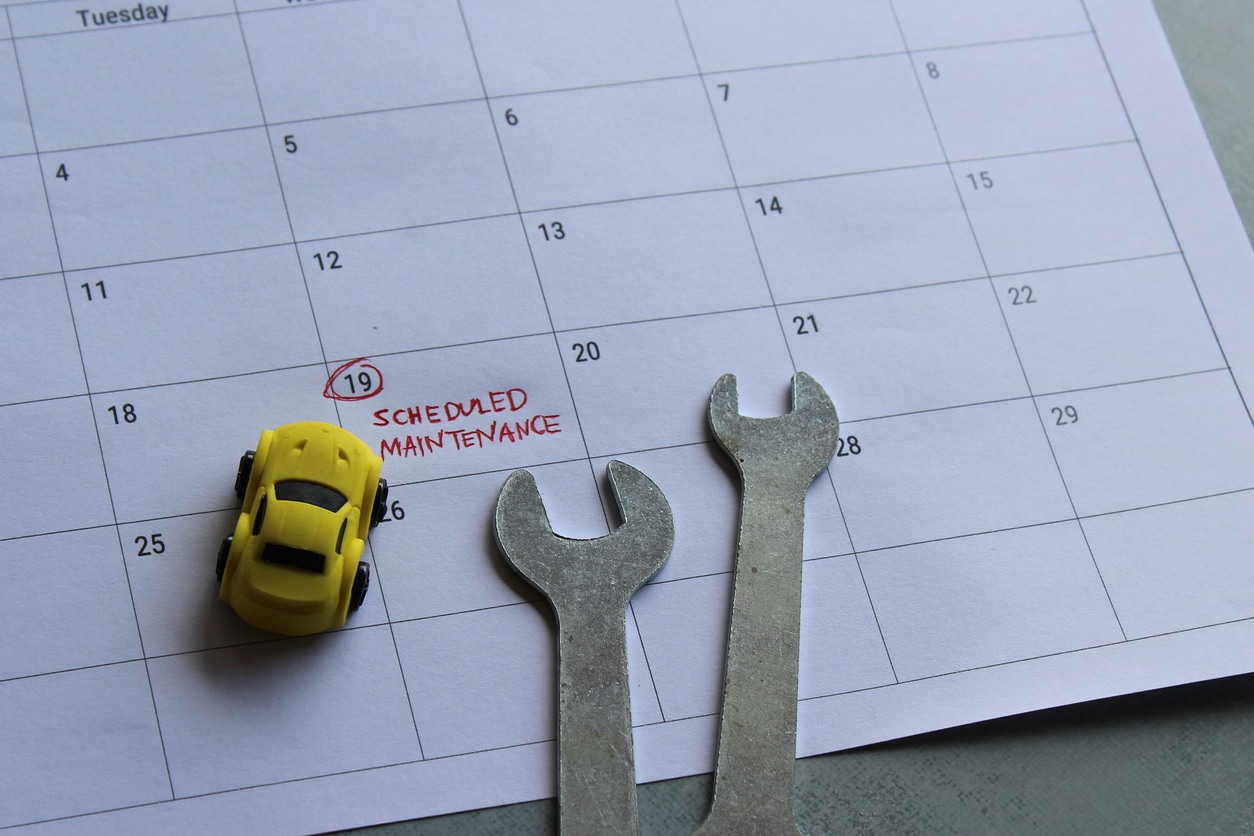Without spark plugs, some vehicles won't start — or go anywhere. Because the health of this car part is directly linked to engine performance, bad spark plugs can often lead to more significant problems, including prolonged cold-starting and misfires during acceleration.
Without healthy plugs, your ride may not be able to accomplish its maximum potential, and your vehicle can see a drop in fuel economy. Nobody wants that. Read on to learn how these components work, signs they need to be replaced, when to get new ones, and more.
How Do Spark Plugs Work?
Think of spark plugs as the tiniest bolt of lighting. Small but mighty, they spark electricity that ignites an air-fuel mixture deep within your car's engine. In turn, combustion creates the energy required to power your car's pistons, and ultimately, get you to your destination. These components also play an important role in helping to dissipate heat from the combustion chamber to the engine's cooling system. Here's the step-by-step:
Step 1: You turn the key in the ignition.
When you start your car by pushing the "ignition button" or inserting and turning your key, the starter motor engages, which cranks your engine.
Step 2: Energy from the battery ignites the plugs.
Electricity from the battery travels to an induction coil on your car's combustion engine, which transforms the battery's 12 volts to as much as 45,000 volts before supplying it to the spark plugs.
Step 3: Sparks fly.
As the induction coil's voltage increases and is transferred to the spark plugs, the plugs ignite the air-fuel mixture inside the combustion chamber — generating a small and controlled explosion in the gap between the plug's electrodes.
Step 4: Combustion moves your car.
Once the air-fuel mixture ignites, a chemical reaction occurs, turning the mixture into an expanded gas or exhaust. The pressure generated by this sudden expansion within the combustion chamber moves your car's pistons, ultimately turning chemical energy into the kinetic energy required to power the engine.
Step 5: The cycle continues.
As you continue on your journey, the spark plugs power through this cycle over and over again, helping your car run smoothly till you reach your destination.
How Do Spark Plugs Go Bad?
Spark plugs may become less effective at doing their job due to time, wear, or other electrical/ignition system issues. They may become "fouled" over time due to combustion, contamination, or overheating, losing their ability to spark the air-fuel mixture and dissipate heat away from the combustion chamber.
Additionally, if they aren't replaced, the gap between the plug's electrodes widens, meaning the spark has to "jump" across a greater distance to trigger combustion. Eventually, widening of this gap may lead to irregular or erratic combustion.
How to Tell if a Spark Plug is Bad?
Spark plugs play a vital role in powering your vehicle, so it's not surprising that the signs of faulty plugs are pretty jarring. A few common symptoms you may notice include:
- Rattling, pinging, or "knock"-like noises. When spark plugs begin to misfire, you may notice unusual noises from the force of the pistons and combustion not working correctly. Pistons travel at high velocities. If the spark plug fires at the wrong time, this could lead to constant rattling, pinging, or knocking sounds.
- Hard vehicle start. If your car is having trouble starting or just feels disjointed and jerky, your spark plugs may not be working right, and this can lead to misfires and erratic performance.
- Reduced performance. When you're out cruising, your spark plugs don't take a break, even when you accelerate and change gears. If the spark that this little plug generates isn't functioning at 100 percent, your vehicle performance will not be at its full potential.
- Poor gas mileage. Lots of things can lead to poor fuel economy, though when it comes to faulty spark plugs, you'll find fuel may be wasted if your vehicle fails to receive the proper spark at the right time.
If you've spotted any of these symptoms, we suggest having your vehicle inspected to prevent further problems. Healthy spark plugs are vital to your car's ability to start up and remain powered.
Get your car back to peak performance with new spark plugs. Schedule an appointment today.
How Often Should Spark Plugs Be Changed?
Luckily, spark plugs don't require replacement very often and can go years and many miles before replacement is needed.
Most auto manufacturers suggest having new spark plugs installed about every 100,000 miles; however, spark plug longevity depends on the engine, condition, and spark plug type. Your vehicle's manufacturer suggested maintenance recommendations may call for more or less frequent replacements depending on make, model, and year.
Are Spark Plugs Universal?
Though many auto parts stores may lead you to believe otherwise, all spark plugs are not made equal! Copper spark plugs, for example, have the shortest life, while ones made of more advanced and durable materials such as platinum or iridium can provide up to four times the life of a copper one. At Firestone Complete Auto Care, we use top-quality spark plugs that meet or exceed OEM specifications, which may help your car perform better, longer.
Does Firestone Carry Spark Plugs That Meet My Car's Specifications?
Meets or exceeds, my friend. Meets or exceeds. That's the mantra around here. That's why we only use top-quality spark plugs that meet or exceed OEM specifications.
What Is The Benefit Of Replacing a Spark Plug?
The primary benefit is knowing your car will fire up without a hitch. Needless to say, that's not all that matters. New spark plugs provide a lot of other performance benefits as well:
- Consistent production of optimal combustion. Fully functioning spark plugs help support a fully functioning combustion system. Get this operating successfully, and a lot of performance issues you're experiencing could be a distant memory.
- Better fuel economy. The National Institute for Automotive Service Excellence says misfiring spark plugs can reduce fuel efficiency by 30%. New plugs, when replaced at specified intervals, can help maximize fuel economy and save some dough.
- Smooth and energetic starts. The first time you turn the ignition with a new spark plug can be an eye-opening experience. The old ones may have been the reason your car was experiencing those jerky starts.
- Reduced harmful emissions. The Environmental Protection Agency states that diligent car care — especially regarding spark plugs — can help increase fuel efficiency and reduce air pollution. That's a win-win.
Schedule a replacement, inspection, or tune-up today.
How Involved is Spark Plug Replacement Service?
The complexity of a spark plug replacement varies from straightforward to very involved. Your vehicle must be worked on when the parts are cold, and the amount of time it takes to complete the service varies by make and model. In some cases, it may be necessary to remove vehicle parts, such as an intake manifold, in order to reach these components. Plan ahead, because a vehicle drop-off is usually required.
Can't I Just Get a Tune-up, Like the Old Days?
Back in the day, a tune-up could include replacing spark plugs, spark plug wires, the distributor, distributor cap, rotor and points, and condenser, in addition to setting the timing and adjusting the carburetor. Nowadays, though, your car's computer does most of the heavy lifting, leaving you to worry most about the spark plugs, air, and fuel delivery system.
Today, the modern "standard" tune-up means changing your spark plugs. A comprehensive tune-up usually involves combining several important jobs, including:
- Performing a vehicle code scan
- Replacement of the air filter
- Replacement of spark plugs
- Replacing the ignition coil boots or spark plug wires
- Replacing the distributor cap and rotor (if applicable)
- Setting distributor timing (if applicable)
- Replacement of the PCV valve (if applicable)
- Replacing the external fuel filter
- Performing a 2 or 3 step fuel system cleaning
- Performing a coolant fluid exchange
- Performing a transmission fluid exchange or drain and fill
- Changing the oil (although this is typically done more often than a tune-up)
* See an auto advisor for complete terms and conditions of written, limited warranties.
Schedule a Spark Plug Replacement Service Today.
Whether you notice signs of faulty spark plugs or simply realize your car is overdue for a "modern" tune-up, the experts at Firestone Complete Auto Care can help! Make an appointment with your nearest car care pros so we can inspect your vehicle and replace your spark plugs with high-quality spark plugs, if necessary.
Get the best spark. Every time. Have new spark plugs installed today.



